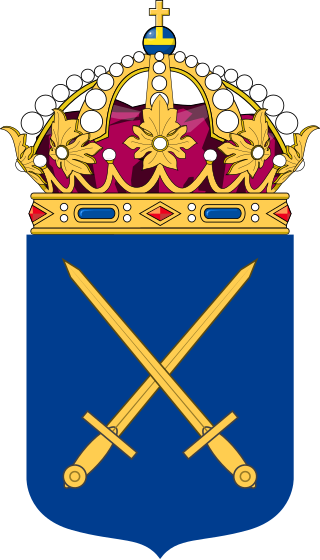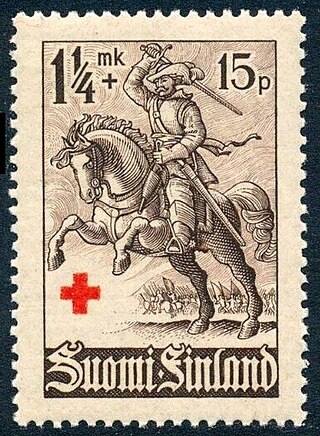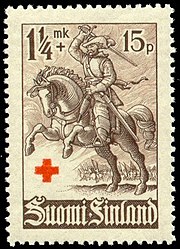
Zacharias Topelius was a Finnish author, poet, journalist, historian, and rector of the University of Helsinki who wrote novels related to Finnish history. He wrote his works exclusively in Swedish, although they were translated early on into Finnish.

The Swedish Army is the land force of the Swedish Armed Forces of the Kingdom of Sweden in Northern Europe / Scandinavia. The army's history dates back to the Swedish War of Liberation in 1521.

The Battle of Breitenfeld or First Battle of Breitenfeld, was fought at a crossroads near Breitenfeld approximately 8 km north-west of the walled city of Leipzig on 17 September, or 7 September, 1631. A Swedish-Saxon army led by King Gustavus Adolphus of Sweden and Saxon Elector John George I defeated an Imperial-Catholic League Army led by Generalfeldmarschall Johann Tserclaes, Count of Tilly. It was the Protestants' first major victory of the Thirty Years War.

The Second Battle of Breitenfeld, also known as the First Battle of Leipzig, took place during the Thirty Years' War on 2 November 1642 at Breitenfeld, north-east of Leipzig in Germany. A Swedish Army commanded by Lennart Torstensson decisively defeated an Imperial Army under Archduke Leopold Wilhelm of Austria and his deputy Ottavio Piccolomini.
Between 1809 and 1917, Finland was an autonomous part of the Russian Empire as the Grand Duchy of Finland. Between 1881 and 1901, the grand duchy had its own army. Before that, several other military units had also been formed.

Hakkapeliitta is a historiographical term used for a Finnish light cavalryman in the service of King Gustavus Adolphus of Sweden during the Thirty Years' War. Hakkapeliitta is a 19th-century Finnish modification of a contemporary name given by foreigners in the Holy Roman Empire and variously spelled as Hackapelit, Hackapelite, Hackapell, Haccapelit, or Haccapelite. These terms were based on a Finnish battle cry hakkaa päälle, commonly translated as 'Cut them down!'

Häme Regiment, was a unit of the Finnish Army located in Lahti. The regiment's main duty was to train conscripts and the personnel of the Finnish Defence Forces and the Finnish Frontier Guard.

Battle Metal is the debut full-length album by the Finnish folk metal band Turisas. It was released on July 26, 2004 by Century Media.

The Kalmar Regiment, designations I 20, I 21 and Fo 18, was a Swedish Army infantry regiment that traced its origins back to the 16th century. It was merged with another unit to form a new regiment in 1928. It was later reraised and disbanded again in 1997. The regiment's soldiers were originally recruited from Kalmar County, and it was later garrisoned there.
"Der Hohenfriedberger", also called "Hohenfriedberger Marsch" or "Der Hohenfriedberger Marsch", is one of the most classic and well known German military marches. It takes its name from the victory of the Prussians over the allied Austrians and Saxons on 4 June 1745 during the Second Silesian War at the Battle of Hohenfriedberg, near Striegau.

Björneborgarnas marsch is a Swedish military march from the 18th century. Today, it is mainly performed in Finland and Estonia and has served as the honorary march of the Finnish Defence Forces since 1918 and is the Estonian Defence Forces' official honorary march.

The Norrbotten Brigade, also NMekB 19, is a Swedish Army mechanized brigade located in the province of Norrbotten, active since 2022. It was previously active from 1949 to 2000. The brigade is located at Boden Garrison, Norrbotten Regiment in Boden.

Kalervo Kurkiala was a Finnish soldier who later became a pastor. During World War I, he served as a volunteer in the German light infantry, his first engagement being on the Misa River in Latvia on the eastern front in 1916. He was a battalion commander in the White Army during the Finnish Civil War, which broke out in 1918. After being ordained in 1919, for a while he was an army chaplain before assuming civilian duties as a pastor and teacher. For several years, he served with the Seamen's mission in Australia. During World War II, in 1941, Kurkiala volunteered as chaplain to the Finnish volunteer brigade in the Waffen-SS. After the war, for many years, he was a pastor in Sweden.
From 1611 to 1721, Sweden was a European great power, becoming a dominant faction in the quest for control of the Baltic Sea and a formidable military power. During this period, known as Stormaktstiden, the Swedish Empire held a territory more than twice the size of its modern borders and one of the most successful military forces at the time, proving itself on numerous occasions on battlefields such as Wallhof, Narva, and Düna. The military of the Swedish empire is commonly recognized only as the Caroleans, which were in fact not in service until the late 17th century under Charles XI and his successor. The Swedish Empire and its modern military force was founded by Gustavus Adolphus, who inherited the throne in 1611 at age 17. He immediately reformed the common European military based on mercenaries to a professional national army. However, before completing his vision of conquering the Holy Roman Empire, the warrior king was killed in action in 1632. His daughter and successor did little to improve Sweden's military position and abdicated early, providing the Swedish Empire with a more warlike ruler. Charles X Gustav was only king for 5 years, but conquered large amounts of territory that still belong to Sweden today. His son Karl XI would further strengthen the army by introducing the Caroleans, which were also used by Karl XII in the Great Northern War.
The Defence Act of 2000 was a defence act passed by the Swedish Riksdag on 30 March 2000, and the largest reorganisation of the Swedish Armed Forces since the Defence Act of 1925. The act was a continuation of the policies set in motion by the Defence Act of 1996: shifting the military's focus from the defence of Swedish territory to a more flexible "operational defence* for smaller-scale peacekeeping operations in foreign nations. Many military formations were disbanded as a result.
The Defence Act of 1925 was a defence act passed by the Swedish Riksdag on 26 May 1925 and came into force on 1 January 1928. The Act specified how the Swedish Armed Forces would operate during the coming years. The Act resulted in a policy of disarmament. The Act would remain effective until the Defence Act of 1936.
Småland Grenadier Corps, designated No. 7, was an infantry unit of the Swedish Army that was active in various forms from 1812 to 1901. The unit was based in Ränneslätt, about 2 km west of Eksjö.
The Karlskrona Grenadier Regiment, designation I 7, was a Swedish Army infantry regiment that operated from 1902 to 1927. The regiment was based in Gräsvik in Karlskrona.












